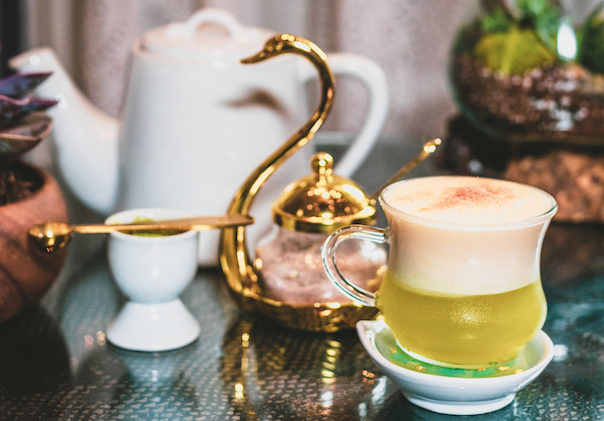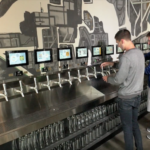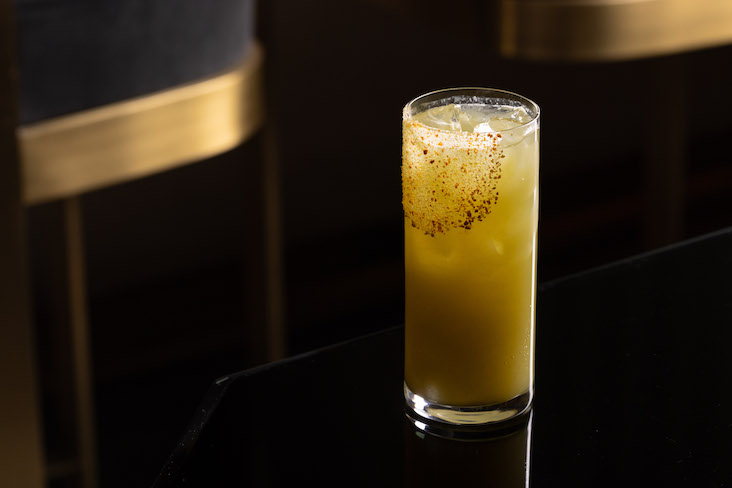The movement toward sustainability behind the bar is heating up.
From ditching plastic straws and stirrers to creating low-waste cocktails and sourcing earth-friendlier ingredients and brands, bar and restaurant operators across the U.S. are taking steps to reduce their carbon footprint. Here’s a look at some of the on-premise sustainability efforts with regard to beverage.
Going Strawless
While the strawless trend started to take shape in 2017, the announcement from spirits giant Pernod Ricard USA earlier this year of a global initiative to ban non-biodegradable plastic straws and stirrers in its business gave the movement a real boost. A number of bars eliminated plastic straws altogether, while some now provide them only upon request. Several have switched to paper straws or reusable options made from metal or bamboo.

Fox’s beverage director Mat Snapp created a signature Azuñia cocktail called the Rhubarbe Paloma— served with a reusable, recyclable metal straw—for The Henry.
Azuñia, an organic and sustainably farmed tequila brand, in September joined forces with Fox Restaurant Concepts for its “No Plastic Straws 365” campaign. Fox’s beverage director Mat Snapp created a signature Azuñia cocktail called the Rhubarbe Paloma— served with a reusable, recyclable metal straw—for The Henry. The Phoenix and Los Angeles locations of The Henry were giving away 2,000 of the metal straws to customers who ordered this featured cocktail through December (or until supplies last).
Consumers not in the LA or Phoenix areas could still participate by taking Azuñia’s No Plastic Straws 365 challenge online. The first 500 people to sign the pledge received a bent metal straw made from durable, food-grade smooth stainless steel.
Recipe: Rhubarbe Paloma
- 1 ½ oz. Azuñia organic blanco tequila
- 2 dashes Grapefruit bitters
- ¾ oz. Fresh grapefruit juice
- ½ oz. Giffard rhubarb liqueur
- 1 Lime wedge
- Splash organic club soda
- Hibiscus salt
Moisten the rim of a Collins glass with the lime wedge and salt the rim with hibiscus salt (25:1 salt: hibiscus powder). Fill with ice. Add all ingredients, finishing with a splash of club soda. Serve with a sustainable straw.
Eco-Friendly/No Waste Cocktails
Some industry watchers predicted that low- or no-waste cocktails would be trending in 2018, and they were right. Trash Tiki, an anti-waste, punk pop-up launched in late 2016 by London bartenders Kelsey Ramage and Iain Griffiths, no doubt played a role.
What started as an online platform to share recipes soon turned into 10-month Trash Tiki world tour of more than 40 cities to throw pop-up events and talk to bartenders about why sustainability is so important. Trash Tiki has expanded into more brands and platforms, including Wasteland Paradise and Common Sense, under the umbrella of the now Toronto-based Trash Collective company.
How are bartenders in the U.S. reducing waste? Jason Stevens, director of bars and beverage for the Austin, TX-based La Corsha Hospitality Group, uses a variety of techniques. For one, he creates syrups, infusions and garnishes for his drinks from kitchen waste. Stevens has also created a structured and detailed prep schedule to reduce waste and spoilage at all La Corsha bar programs.
At the Mattie’s at Green Pastures and Boiler Nine concepts, Stevens incorporates freeze-dried organic fruits into cocktails instead of fresh fruit. This helps eliminate spoilage and food waste, plus it reduces shipping weight of the ingredients while increasing natural flavor. For example, Boiler Nine’s Caravan is made with organic, freeze-dried strawberry powder, dry rose, simple syrup, herbsaint and a pinch of salt.
The menu at the Gibson + Luce craft cocktail bar at The Life Hotel in New York includes several “closed loop” cocktails that use the entirety of the ingredient, making little or zero waste. The former speakeasy reopened in October under the management of Craveable Hospitality Group in partnership with mixologist Pam Wiznitzer. Bartender Luis Hernandez sources components from the kitchen and uses excess ingredients for cocktails as well.
All-Natural Wines
As more consumers demand craft, pure and sustainable products, interest in natural wines has picked up. While there aren’t official rules and regulations on natural wines, they are typically described as “low-intervention” and free of additives and filtering, so they may have a slightly funky aroma, fizzy texture or cloudy appearance.
Thought they tend to be small-production wines, natural wines are a fast-growing category in major markets and trending across the country. Many operators now keep a selection of natural and biodynamic wines in rotation.
The wine list at Frenchette Bistro in New York, which opened this past spring, focuses on natural wine, while Botanica in Los Angeles (launched in May 2017) serves only natural wine. Pammy’s in Cambridge, MA, open since July, carries a curated selection of wines—all of which are natural.
Natural wine bars Dio and Primrose opened in late 2017 in Washington, DC. The wine menu at the two-year-old restaurant Giant in Chicago is primarily made up of minimal-intervention wines, including a few pétillant naturel sparklers.
Melissa Dowling is editor of Cheers magazine. Reach her at mdowling@epgmediallc.com. Read her recent piece, Ruby Tuesday Embraces its Southern Heritage.









